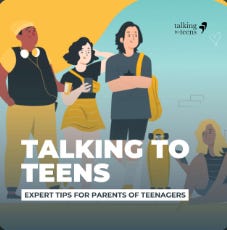In this newsletter, we provide you with notes on Solving Conflict and Building Connection, an episode of Talking To Teens: Expert Tips for Parenting Teenagers.
Hosted by Andy Earle, a researcher, and writer who focuses on adolescent risk behaviors and parent-teen communication.
He is joined by Dr. Rick Hanson, author, psychologist and the founder of the Global Compassion Coalition and the Wellspring Institute for Neuroscience and Contemplative Wisdom
Read our notes below.
Topics Covered in this Summary
Understanding Teenage Behavior
Communicating with Teenagers
Understanding Teenage Behavior
It doesn’t take long for a disagreement with teens to turn into a full-fledged battlefield. One minute, you’re trying to ask about their day, the next thing they’re saying they hate you and slamming the door in your face.
But as parents, we must know and understand that adolescence is an important developmental stage, characterized by marked biological and physiological changes.
Behaviorally, adolescence is associated with volatile emotions and boundary-testing behavior as individuals explore and assert personal identity, learn to navigate peer relationships, and transition to independence.
Young people are undergoing significant physical transformations too. It is distinguished by rapid development, hormonal alterations, physical changes, and changes in brain structure. This stage is marked by emotional upheaval, insecurity, peer pressure, risk-taking behavior, impulsive decisions, and pushing the boundaries of permissible behavior.
It is also a time where young people make mistakes, which if not dealt with constructively, and sensitively, could result in long term consequences.
Adolescence is a time when young people require a protective structure, strong role models, and beneficial activities that channel their energies to good use.
Communicating with Teenagers
To cope with a teenager’s challenging behavior, we must create new ways to communicate with them. This requires going beyond the surface level and looking into how kids are truly feeling. This will assist us in breaking the cycle of misinterpretation.
Being a teen is not easy, and our children may be feeling lost or upset without a method to express themselves. If you think kids are acting selfishly, it's probably not because they're fundamentally self-absorbed, but because teenagers in general are.
We expect teens to sit through school all day, ignore pleasurable pastimes, and push them towards far-off careers. All of this combined with bullying, mental health issues and social media can be overwhelming. It is useful to keep this in mind the next time we think kids are being unreasonably moody.
Embracing vulnerability is one way we may develop positive communication with our teenagers. It might be difficult to achieve the correct level of honesty without oversharing or compromising parental authority, but if we desire open communication, parental vulnerability is essential.
If we tell them how their actions make us feel, they may begin to grasp the consequences of what they've said or become more conscious that you are not their enemy.
We also need to figure out what kids need and find a method to work with them to reach an agreement. No matter what, being criticized by teens is inevitable, and it's just something parents pretty much have to live with.
We don't have control over what teenagers say to us, but we do have control over how we respond. At the end of the day, we may be grateful to teens for their criticism because it is a better alternative to being completely cut off.
Useful Links
Follow All Star Parent on Facebook
Follow All Star Parent on Instagram
Follow All Star Parent on Twitter
Listen to the original episode



